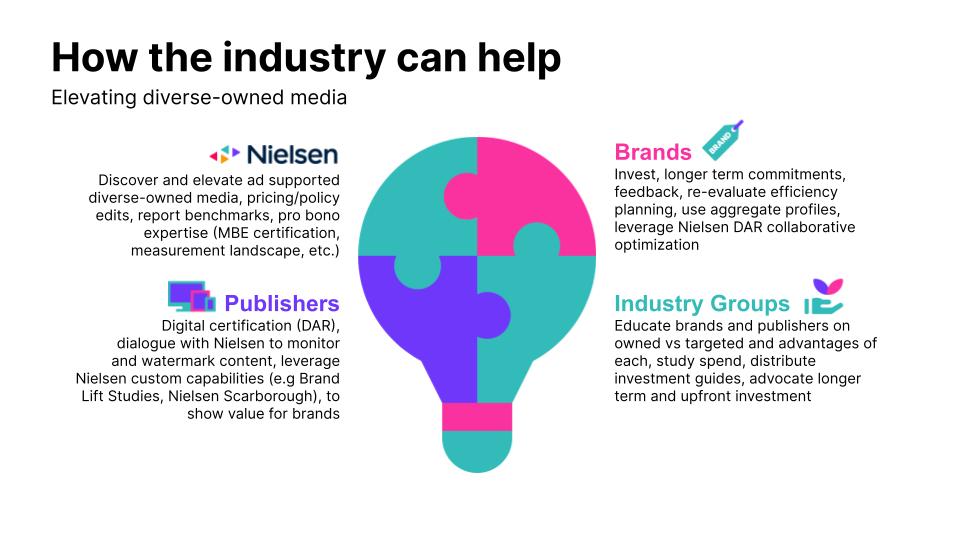SOURCE: Nielsen
DESCRIPTION:
With the rise of the Black Lives Matter movement, many marketers have made commitments to increase their investments in Black-owned media. The social justice movement has also inspired all consumers—not just diverse consumers—to expect brands and businesses to do more to support social causes, including through the messages in their advertising. Advertising in diverse-owned media often allows brands to better engage diverse audience segments and hyperfocus messaging. But now that brands are making the commitments, how can they ensure that their dollars are truly making a difference?
The first step is to raise the visibility of the diverse media suppliers that exist so they have a fair and equitable chance to get in front of ad buyers. Advertisers who want to respond to calls for social justice with commitments to spend more on diverse media know that it’s about more than just targeting diverse consumers. Prioritizing diverse-owned and diverse-operated media is a way to break through systemic barriers within the billion-dollar advertising industry for diverse media suppliers. This, in turn, creates a more equitable playing field for historically excluded media outlets to compete with the larger media companies. Some diverse media owners have even taken matters into their own hands. Group Black, for example, a collective and business accelerator for Black-owned media, launched to deepen the pipeline of Black-owned media companies, supported by a $75 million ad-spend target from ad agency WPP.
Identifying all the players in the diverse-owned media market and showing the value of their audience is another critical step. Nielsen is working with industry organizations such as ANA’s Alliance for Inclusive and Multicultural Marketing (AIMM) and Media Framework MAVEN to identify and provide aggregated metrics on the reach and audience profiles of validated and certified diverse/minority owned media so marketers and agencies can discover and build partnerships with these companies.
Creating measurement parity for diverse-owned media companies will also require better measurement tools. Nielsen has been closing this gap by revisiting its reporting and pricing policies to include more diverse media suppliers. Since November 2021, the Nielsen local TV service includes audience estimates of full power, non-subscribing minority-owned and nonprofit TV stations. Additionally, minority-owned radio stations that qualify for exempt status, are also reported in the Nielsen Audio in Summary Data Sets, regardless of subscriber status. Nielsen is working directly with diverse media suppliers to deliver greater transparency and more granular metrics that advertisers are looking for. One example is Canela Media, a Latina-owned media company, which has tripled the number of campaigns measured with Nielsen as a part of the pilot program.

Advertisers can also lean in to ensure that there is long-term systemic change, and that their increased investment is not just a “check the box.” General Motors, which has pledged to allocate 4% of its U.S. advertising budget to Black-owned media companies by 2022, plans to double that to 8% by 2025. One of the challenges for emerging diverse-owned media companies is that some are not officially certified as a minority business, so investments made with them may not count toward an advertiser’s diverse spend goals. Nielsen has collaborated with P&G to seed a fund with the National Minority Supplier Development Council (NMSDC). This fund supports the certification process, expanding the pipeline of diverse owned media officially defined as a Minority Business Enterprise (MBE). The more diverse media owners defined as an MBE, the more opportunity for ad spend to be included in an advertiser’s diverse investment goals.
It’s clear why companies have made the commitment to increase ad spend with diverse media. Making the biggest impact with those dollars takes a bigger commitment to truly understanding the diverse media landscape and how to win with consumers. With an increasingly fragmented media landscape, investing in diverse-owned media is a winning long-term strategy for advertisers.
Additional Resources

Diverse-Owned Media Reach and Audience Profiles
KEYWORDS: Nielsen, NYSE: NLSN, Alliance for Inclusive and Multicultural Marketing, Maven








